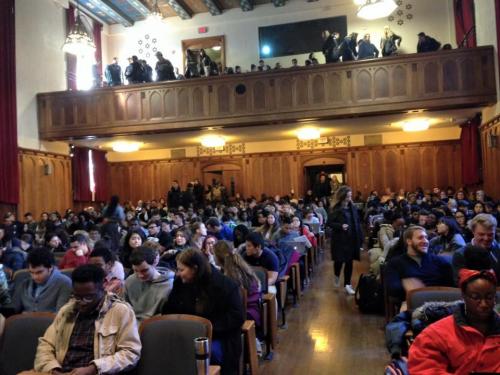YGSNA Members Offer Seven Spring 2016 Classes, including (potentially) Yale College’s Largest

Ranging from The Divinity School to American Studies and from Linguistics to History, YGSNA members are teaching an unprecedented number of Yale students in Native Studies courses this semester. American Studies doctoral candidates Tyler Rogers and Anya Montiel are each teaching their first seminars, “Indigenous Feminisms” and “Native American Art,” respectively. Professors Bowern, Dubcovsky-Joseph, Blackhawk, Rasmussen, and Wegner are offering both new and existing courses.
Many seminars as well as Rasmussen’s lecture course are heavily over-enrolled. Over seven hundred total students are collectively shopping the below seven classes. In particular, “Race and Gender in American Literature” has over five hundred students with preliminary interests in the class, making it potentially the largest course at Yale this semester. It uses a series of published Native texts as well as examines the unpublished Fort Marion ledger books authored by Kiowa and other Southern Plains Indian captives held by Yale’s Beinecke Library. Highly prized and often studied by art historians and collectors, such works are becoming increasingly recognized by literary scholars and historians.
Indigenous Feminisms
Tuesdays 2:30-4:20
Instructor: Tyler Rogers
Description: Exploration of a wide array of indigenous feminisms—drawn from various thematic and transnational contexts across the Americas and Native Pacific—so as to analyze the scope and significance of such knowledges, particularly as they relate to broader theories and practices of decolonization.
Native American Art
Mondays 2:30-4:20
Instructor: Anya Montiel
Description: Exploration of the issues surrounding art created by Native people of North America. The ways in which Native art, unlike other “ethnic” arts of the United States is tied to sovereignty and relations with federal and state entities. Discussion of the “Indianness” of Native art and how certain issues have dominated the field for decades.
Language and Power
Tuesdays and Thursdays 11:35-12:50
Instructors: Claire Bowern and Alejandra Dubcovsky-Joseph
Description: The relationships between language and power explored through the perspectives of linguistics and history. How and when languages change, disappear, and are created. Focus on the Americas and on four outcomes of language contact and their social precursors: pidgins, creoles, mixed languages, and language death.
American Indian Law and Policy
Tuesdays 9:25-11:15
Instructor: Ned Blackhawk
Description: Survey of the origins, history, and legacies of federal Indian law and policy during two hundred years of United States history. The evolution of U.S. constitutional law and political achievements of American Indian communities over the past four decades.
Indians and the Spanish Borderlands
Tuesdays 7-8:50
Instructor: Ned Blackhawk
Description: The experiences of Native Americans during centuries of relations with North America’s first imperial power, Spain. The history and long-term legacies of Spanish colonialism from Florida to California.
Race and Gender in American Literature
T/Th 11:35-12:25
Instructor: Birgit Rasmussen
Description: The role of literature in constructing representations of America as an idea, a nation, a colonial settlement, and a participant in world affairs. What kind of place America is and who belongs there; the consequences of America’s history for its national literature. Emphasis on the ways texts represent and contest social concepts of race and gender difference.
Native Americans and Christianity
Tuesday 1:30-3:20
Instructor: Tisa Wenger
Description: This course examines the complex and often painful history of American Indian encounters with Christianity in colonial North America and the United States. Moving from the early colonial period to the present, and with particular attention to Native American voices, we explore a variety of indigenous responses to Catholic and Protestant missions and the development of distinctively Native Christian traditions. Along the way we interrogate and historicize key trends in the study of indigenous Christianity, including Red-Power era critiques of missions, the influence of postcolonial theory, and the recent emphasis on indigenous Christian agency. Area III